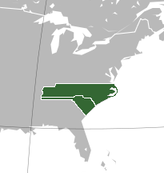In Carolina, where many Huguenots had settled since 1685, but whose civil equality was disputed by the inhabitants of English descent, Holy Communion was administered for the first time in 1696. The Puritans in New England had formed a society "for the advancement of religion in the Southern States," and had sent some preachers there. The younger John Cotton had been working in Charlestown since 1698, where he built a church and had many visitors. At the close of the 17th century there were only three churches in all of South Carolina (one for the Presbyterians, one for the Episcopalians, and one for the Quakers), all located in Charlestown. In North Carolina, the first churches were built in 1705 and 1706.
The Presbyterians had the most influence at that time, although all Christian believers were promised free exercise of religion. In Charlestown, the Episcopal minister Marshall had gained general respect. Joseph Blake, then governor, a church-minded man, applied to the legislature to secure to the same not only £50 annually, but a house and other income. Out of benevolence towards Marshall's person, all the non-Episcopalians also voted for this motion, <pg 30> which now became law, and the beginning of a series of ordinances in favor of the "Church of England."
As early as 1702 another law was published, requiring £30 from each district for the maintenance of a preacher; and in 1704 the Episcopal party in the Legislature succeeded in having two new laws passed, which had no other object than the complete suppression of all other Christian denominations, and the sole favoring of the "Church of England." By one of these laws all non-Episcopalians were excluded from all civil rights; and by the other an ecclesiastical court was instituted, before which all religious questions and grievances should be brought, and which should provide for the preservation of religious uniformity. (* Grahame's Hist. p. 282)
These unjust and most foolish laws, however, not only made bad blood in Carolina, but excited a storm of indignation in England. Even the "Society for the Propagation of the Gospel," which consisted entirely of Episcopalians, declared that they would not send any preachers to Carolina until these laws were repealed. When Lord Granville [John Carteret] lost his ministry in 1706, that carnal religious zeal subsided somewhat in Carolina also. True, the Presbyterians, Quakers, etc., did not then regain the complete equality with the Episcopalians which they had originally had; but they were still tolerated. In 1707, South Carolina was divided by a new law into ten parishes, and in each of them the building of a church was ordered, in which the service was to be held according to the manner of the "Church of England. The churches were soon built and in 1707 the "Society for the Propagation of the Gospel" sent six preachers to take the well-supplied parishes.
Much as in Virginia, Maryland, and Carolina, so in New York, where the Episcopal Church had been the only one recognized by the state authorities, the connection between church and state was severed.
Only much later did this also happen in New England. There, only the Congregationalists were legally recognized; all other church denominations were only tolerated and, compelled by state law, had to help maintain churches, schools, pastors and school teachers. It was not until 1816 that the Episcopalians, Baptists, Methodists, Universalists, etc. in Connecticut succeeded in obtaining a majority in the legislature, and in repealing those perverse laws that weighed on the conscience. Instead of this, it was enacted that every taxpayer should support the parochial church or any other, according to his own choice. — New Hampshire and Maine proceeded in the same way. Vermont had already left it up to each citizen to decide which church he wanted to support.
Massachusetts was the last state to give complete freedom to the church. — The founders of this colony had desired and aimed at a perfect theocracy (rule of God), and had boasted of the "union" which existed between "the vineyard of the Lord" and "the state”. They had "rested under the shadow of both" with great satisfaction, and knew much to say of the supposed "glorious fruits" of that union. Cotton Mather, for example, one of the most famous preachers of the "Puritans," said, "The ministers of the gospel would have bad times if they had to rely for their provision on voluntary contributions from the people." And likewise he said, "The laws of the province (Mass.) have received royal sanction, and are therefore royal laws. By these laws it is enacted that public worship shall be held in every establishment; that the person chosen by a majority of the inhabitants shall be considered as the pastor of the place; and that the salary of the same, to be determined by all, shall be raised by an equally distributed tax. Consequently, the pastor chosen by the people is not only Christ's, but also the king's servant; his salary is levied in the king's name, and is the king's benefit to him." (* Baird, p. 227.)


![Lord Granville [John Carteret] Lord Granville [John Carteret]](https://blogger.googleusercontent.com/img/a/AVvXsEg-g7sfIlUQwigIWitnQPss8jzACexZ7sSRA6j8U19Wptp_M3sWxZRXnb9PIexXjHJfNIMWLJ94ngmCR58xhnLewFMBr9Du6Y_laplyjn4LkrgBX4SDt5936RBT30Gs3536Lkr-SlAuoMHWe36gTwC0qHc3JM7jxRACm_b04NBWFCYGfWjYrmaPBsk=w115-h147)


No comments:
Post a Comment
Comments only accepted when directly related to the post.